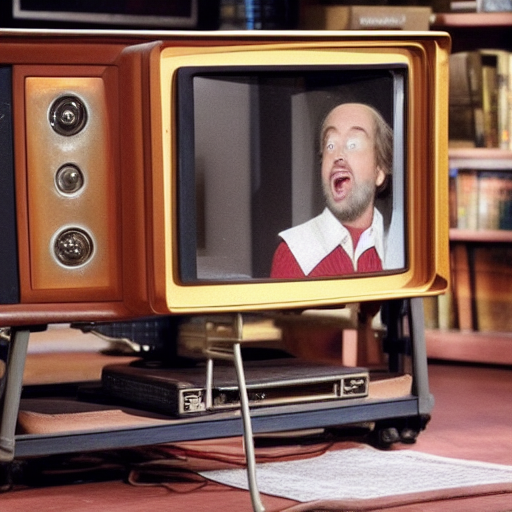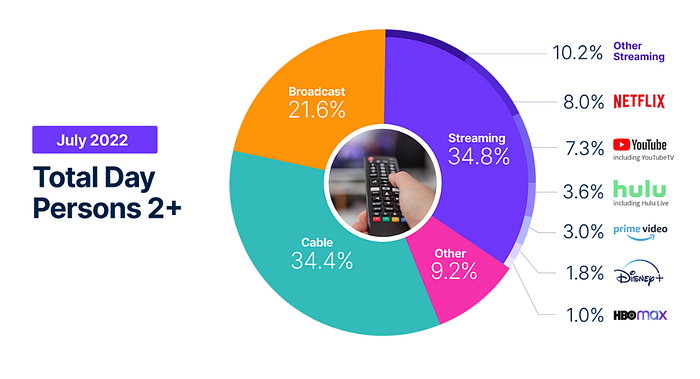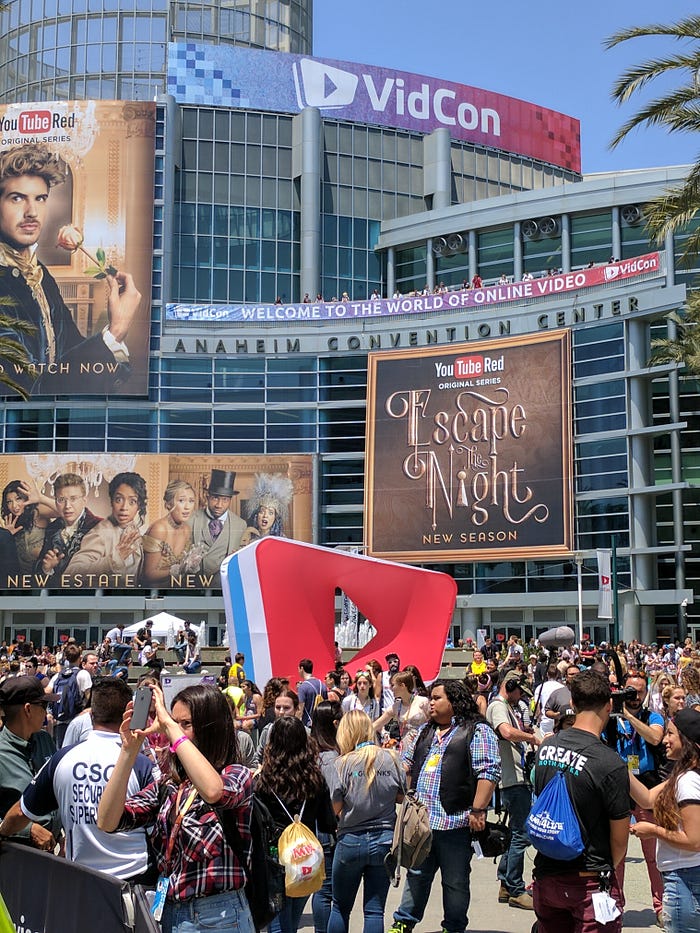

What Is Happening to TV?
source link: https://medium.com/whither-news/what-is-happening-to-tv-e48af5e18de7
Go to the source link to view the article. You can view the picture content, updated content and better typesetting reading experience. If the link is broken, please click the button below to view the snapshot at that time.

If AI made TV: This is the result of asking Dreamstudio for “an old TV set with Shakespeare on a sitcom”
What Is Happening to TV?
Is the age of broadcast and blockbusters at an end?
TV has had more supposed golden ages than the Queen had bling: Sid Caesar’s brief blip during TV’s infancy was hailed as one such shimmering age only because what followed — America stranded on Gilligan’s Island — was so unbearable as to make his Show of Shows’ Vaudeville shtick seem worthy of nostalgia. On broadcast, Cosby — yes, that Cosby, but only at the beginning — and Hill Street Blues marked a prime-time pop-cultural high. Then with cable’s freedoms came what I think of as TV’s real golden age, spanning The Sopranos to Succession.
TV today is certainly in no golden age. Prime-time, broadcast TV is profoundly self-parodic, populated with sitcoms that look as if they ran out of Viagra, cop- and doc-shows exhibiting the production and thespian quality of telenovelas, and “reality” shows that have lost any hold on reality. On premium cable, I pay for HBO and Showtime every damned month, watching none of it, waiting for Billions and Succession. On regular cable, I let MSNBC doomscroll the news for me — in between commercials for butt-cheek cream and dancing poop emojis (have they no standards?) — and then gratefully fall asleep to Guy Fieri’s comfort food. Netflix is so dark it has become Black Mirror. I dread subscribing to Apple TV+, Disney+, Discovery+, ESPN+, and all the other pluses for fear of what it will take to cancel them. Just yesterday, I received an actual letter delivered by the Post Office from Amazon saying, “We’re sending you this letter because you are an Amazon prime member who has not recently used any of the video benefits available to you.”
I was, for many years, a TV critic: the Couch Critic at TV Guide, the first TV critic at People, and founder of Entertainment Weekly. I was born with and grew up with TV. In the day, I defended television, which was almost as difficult as defending the internet is now. Of course, there are still good things to watch on TV. But given the medium’s current state, I am concerned about its health. Consider recent developments:
The Times reported that NBC is considering handing over its 10 p.m., prime-time hour to local stations — which is even more of a surrender than giving it to Jay Leno. This week, The Times valiantly tried to find 41 shows to recommend this fall — only five from network prime time, the rest mainly found in the bottoms of barrels — while the newspaper’s own critics mourn the death of fall TV. (I, too, am old enough to remember when fall brought new TV series and car models instead of just new phones.)
If network prime time has lost its value, so have networks, so has television, so has broadcast.
Cord-cutting continues apace, so cable is ailing, too. Thus all Hollywood is rushing to stream. Nielsen just reported that, for the first time, streaming surpassed both broadcast and cable in time spent watching in the U.S.:

Nielsen
But hold off writing that hot take about streaming taking over the world. Even as it triumphs in viewing time, The Washington Post declares that streaming “is having an existential crisis, and viewers can tell.” Take HBO, lately acquired by Discovery, which is merging the former’s streaming network, HBO Max, with the latter’s, Discovery+. To streamline — to cut costs — both are not just canceling shows but erasing them from the archives and even from social-media mentions. Netflix, which last year spent $13.6 billion on programming, is panicking, cutting back, and adding ads. Writers, producers, and actors are panicking, too, as they are finding fewer buyers for their output in Hollywood’s new monopsony — that is, a market with fewer and fewer buyers. There are only five corporate-conglomerate major studios now: Universal (NBC), Paramount (née Viacom), Warner (ex Time Warner, ex AT&T, now Discovery), Disney, and Columbia (Sony). And don’t forget that Amazon bought MGM.
Why is this happening now? In a fascinating Twitter thread, University College London researcher G. Vaughn Joy said we are rapidly reverting to the bad old days of Hollywood’s studio system. Recall that in those days, five all-powerful studios controlled entertainment from end to end, from production to distribution to exhibition. A 1948 Supreme Court anti-trust decision led to the Paramount Decree, forcing studios to divest their movie theaters. In the happy heyday since, independent theaters and production companies flourished.
Unbeknownst to me and maybe to you, in 2020 Trump’s anti-anti-trust Justice Department asked the court to sunset the Paramount Decree because, well, times have changed. That took effect just last month.
So now big studios can once again lock up vertical integration in entertainment, from production to distribution to exhibition, not in movie theaters — they are rapidly going bankrupt — but on your small screen via their streaming services. There is no longer a bright line between movies and TV shows, between broadcast and cable, between production and distribution; it’s all a stew of stuff flowing by your house in streams, each with a toll booth.
We tend to think of media as immutable institutions. But nothing in media is forever. In addition to my big book, The Gutenberg Parenthesis, coming out next year from Bloomsbury (more plugs coming soon), I’ve been writing a short book on the magazine as object (also for Bloomsbury). In my research and reminiscences, I come to see that all media artifacts — a magazine, a show, a series, a newspaper, a channel — are evanescent, like a bubble in the champagne glass of time; ultimately, so is any medium: television, radio, magazine, movie. I’ll get to the book in a minute.
Is this the internet’s fault? Yes, for once it is. What the net destroys is scarcity and scale. It kills the blockbuster. It massacres mass media. But isn’t the internet all about scale, you ask? Yes, but in a network ecology, it is that unprecedented scale that permits anyone connected to it to speak, to create, to collaborate, to share. We didn’t end up in a 500-channel world but in a five-billion-network world, each unique. So now there is an abundance of voice and creativity and every old medium — each of which trafficked in scarcity of space, time, talent, or attention — must now compete in a marketplace of abundance. The first reflex of old media is invariably wrong: to seek protection against new competitors by lobbying in Congress and courts, to buy up competitors to become bigger yet (see: Discovery + Warner), to reduce costs and thus quality, to raise prices.
All media are affected. The newspaper industry is consolidating into the hands of hedge funds and is engaging in profound journalistic conflict of interest by lobbying for protectionist legislation (one attempt just failed). The magazine industry is consolidating (see once-mighty Time Inc., sold into homemaker heaven Meredith, and sold in turn to content sweatshop Dotdash, with various of their magazines — including my own Entertainment Weekly — folded along the way). The book industry is trying to hold onto its old ways; see this saga about the resource and risk poured into making just one book a best-seller; how can this be sustained and how often can it succeed? The music industry did all this and more until it finally saw the light, clawed back, and found growth in a new abundance of talent, genres, and fans.
What comes next? At first, what comes next is inevitably derivative of what was. Marshall McLuhan said “the ‘content’ of any medium is always another medium,” that is, the medium that came before. See how, a few years ago at Vidcon, YouTube was pushing shows that looked a lot like old TV series.

YouTube has since killed much of this effort because it was expensive and didn’t work. Of course, it wouldn’t. YouTube should not aspire to be TV. It still must figure out what it means to be YouTube.
What we are left with today is a mess. TV and movies are still hoping for blockbusters and so they invest only in what they believe are sure things — Game of Thrones the Presequel House of Dragons — and otherwise, they fill their channels with cheap pap. Producers, writers, and actors will no longer find studios willing to back the endless credits of their big-budget productions. Streaming services will fold as viewers get frustrated paying for crap.
In each medium before, it took time to invent new, native genres. In The Gutenberg Parenthesis, I recount a rush of innovation that came a century and a half after movable type with the creation of the essay, the novel, and the newspaper. In my magazine research, I saw how new forms met new opportunities and needs: how Harper’s started in 1850 with a mission to curate a new abundance of content; how Godey’s found value in women as a new market; how Ebony outlasted Life and Look as white people abandoned their picture magazines when they saw themselves on TV but Black people did not; how Henry Luce and Briton Hadden invented not only the newsmagazine but the media corporation. As a TV critic, I came to appreciate the sitcom as well as the series, the miniseries, and the soap opera as genres native to the medium.
What will the new, native genres for the post-mass, post-theater, post-broadcast, post-blockbuster internet ecosystem look like? I cannot know. They are only now being germinated, mostly by people who could not have survived the gauntlet of old media. I think we see hints of that future in TikTok, which to my mind is the first truly collaborative creative platform original to the net (thus: Ratatouille the TikTok Musical and the Unofficial Bridgerton Musical, which is being sued by big, bad Netflix). We see hints, too, in Wattpad, a receptacle for the energy and affection of fan fiction. No, I am not saying this is the future of culture, only that that future can come from unexpected places. While the big, old companies try desperately to hold onto their control, cultural insurgents will undermine them.
I’ve been thinking about the institutions of culture and media — editing, publishing, networks, and so on — and what we may lose if or when they disappear. I celebrate the fall of the gatekeepers who restricted media to the privileged and powerful, the elite and highbrow. I am glad for the end of the Cronkitization of journalism and civic life: the hubris that one old, white man could speak to and for all. I am happy to see our sitcom addiction to happy endings fall to the messy realism of, say, Breaking Bad. I do not miss the paternalistic nature of mass media, but I do regret that media today have not maintained its sense of mission; see how network TV entered into public discourse about bigotry (Roots, All in the Family, Will & Grace) but is all but silent today on evangelical white supremacy and authoritarianism.
We may miss past institutions’ contributions to the culture — finding, nurturing, goading talent — until these institutions are eventually replaced as needs demand.
I believe culture will come out the other end better for the turmoil: more representative, less exploitative, less expensive, more collaborative, more inventive. In the meantime? It’ll be a mess.
Recommend
About Joyk
Aggregate valuable and interesting links.
Joyk means Joy of geeK